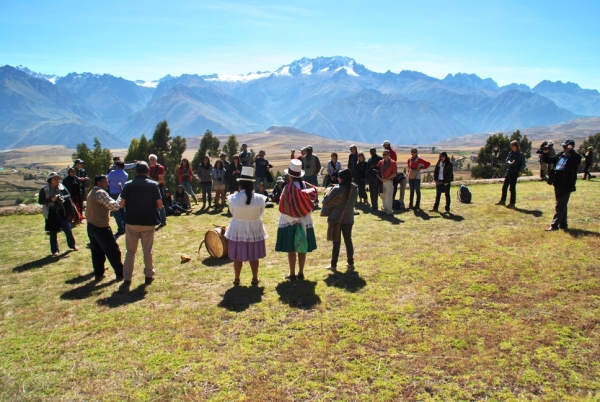WMF… from words to action

"...From words to action " was the motto of the World Mountain Forum (WMF), held from May 22 to 24 in Cusco, Peru. The WMF was planned and developed as a meeting space for science, policy and activism on sustainable mountain development from around the world.
The Forum brought together government representatives from Europe, Central Asia, the Asia Pacific region, Africa and Latin America, as well as development actors, scientists and researchers, leaders of mountain communities and policy makers from Peru and other mountain countries, with the purpose ofstrengthening links, sharingknowledge and experiences, and jointly establishingpolicy proposals to promote collaborative activities and facilitate direct dialogue across governments, institutions and societies.
The WMF 2014 was an effort of eight institutions (SDC, CONDESAN, ARCOS, ICIMOD, UCA, FDDM, CDE, and the University of Zurich, most of them members of the Mountain Partnership) whichin alliance with UNEP, UNESCO and FAO, meet every two years in one mountain region of the world to raise awareness of the value of mountain ecosystems, their goods and services and the importance of the communities that inhabit them to sustain life, now and in the future. This year, the Peruvian Government led this event, in the framework of the coming COP20 in Lima.
The mountains provide us with water, food, energy, minerals and recreation. They are spaces for the preservation of culture and biodiversity. Every good and service we get from mountains is threatened by global changes: urban growth, migration, agro –exportation and mineral extractions.
When we talk about mountains, we are talking about water and food security, family farming and mountain communities. When we talk of sustainable development in mountains, we must think how to preserve life and natural resources while our mountain cities grow.
The main conclusion of the forum was that we have to find new development ways and paradigms that reconcile people and the environment.
Finally, the following are points to highlight from the event:
- All WMF participants recognized that science is clear in on the main challenges and threats mountains face (particularly in relation to climate change), and agreed that the time to move from words to actions has arrived. That means that is necessary to work in policy actions to protect mountains, their resources and people.
- The renewed commitment from the Peruvian Environment Ministry, through Mr. Mariano Castro – Vice Minister of Environmental Management, to call all the sectors (Government, civil society and the private sector) at the national level to work together for the conservation of mountain ecosystems, and to call all mountain countries to take concerted actions. The COP20 offers an opportunity for giving continuity to the Forum’s discussions. The Mountain Pavilion, planned in the framework of the conference, was mentioned in this regard.
- It is necessary to change the prevailing development paradigm for one that focuses on re-establishing the balance between society and nature. Interesting examples were given of how this is happening in various mountain regions, clearly improving populations’ quality of life by reducing malnutrition, improving education and infrastructure.
- Over 100 experiences on sustainable management of mountain natural resources were shared. These can be used, adapted and replicated by all those who are committed to start actions on the different mountain priorities: climate change adaptation, agro biodiversity preservation, family farming, food and water security. In addition, the Forum had the opportunity to present the exhibition
- “Impacts from climate change in the mountains of the world” by UNESCO, which through satellite images shows dramatic effects of climate change on mountains worldwide.
More information
- Thematic Infograhyonthe Second International Terraces Congressand the Word ld Mountains Forum
- IISD report on the WMF: https://worldmountainforum.files.wordpress.com/2014/01/wmfsummary.pdf
- WMF Flickr photoalbum: https://www.flickr.com/photos/infoandina/sets/72157644460439418/ - MP álbum: https://www.flickr.com/photos/mountainpartnership/sets/72157644559492029/
- More information on the UNESCO exhibition
- Official website of the World Mountain Forum, with all presentations and highlights: http://wmf.mtnforum.org

Facebook comments